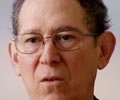Eric Pooley Former managing editor, Fortune magazine

There are significant differences between McCain and Obama. Sometimes those aren't readily apparent because both of them support a mandatory declining cap in greenhouse gas emissions. …
The way I like to think of it is that McCain wants to be the business-friendly cap-and-trader. He says: "Well, I'm for a cap-and-trade system. But there's a lot of other stuff that I'm not for. So I'm not going to put a lot of onerous regulations on top of that. I'm going to let the market take care of this." Obama says: "I'm for a market mechanism. But I also think the gravity of the problem demands that government be more interventionist." …
Can Obama get that done? Or is McCain more grounded in his understanding of the power of big business?
Obama does not have the track record that McCain has on this issue. McCain and [Sen. Joseph] Lieberman [I-Conn.] have pushed serious climate legislation in the past. Obama has come to the issue of it later. … That's not to say that Obama doesn't get it. I think he does get it. But McCain risked a lot of political capital and bucked his own party to drive bills twice before with Joe Lieberman. And he deserves credit for that. Because McCain is a Republican, were he to be the next president, he would likely bring some Republicans with him. So he might find it easier to pass a cap-and-trade bill than Obama would. …
I like to think that it's not just ideology; it's about geology. If you're from a coal state or an oil state chances are you're going to be against strong climate legislation, whether you're a Democrat or a Republican. …
McCain on drilling, what happened?
When we began this campaign, John McCain was opposed to offshore drilling. When he saw where the political winds were blowing, he reversed course, and supported offshore drilling.
Because of the high price of oil?
Yeah. You had $4-per-gallon gasoline. You had Americans who were very exercised about it and nobody talking about any short-term policy solutions. So in the absence of real solutions, you saw phony solutions step up. The first one was the gas tax holiday. Obama opposed that and made it seem like the ridiculous proposal that it was and scored, I think, a big win by being smart and sticking to his guns, where McCain and Hillary Clinton both favored it. …
But when [offshore drilling] came along, Obama tried to oppose it, and it didn't work so well. … [He] finally realized he was in the wrong place, and so he switched. He said he would support drilling as part of a larger package. … [The] Democrats had finally realized that unless you were in favor of some form of drilling, the American people didn't want to hear anything you had to say on energy. … Drilling was sort of the litmus test that gave you the credibility to talk about the issue. So Obama had to switch. And I think the position that he ended up picking up was the only one available to him. And it had the advantage of being in tune with political reality. In order words, "I'll use this as a bargaining chip to get other things that I want." That's how the world works, and I thought it was smart position. …
What positions do they have with regard to the oil companies?
Obama is in favor of a renewable energy portfolio that mandates that utilities and other producers get a certain percentage of their electricity from renewables. He's in favor of a windfall profits tax on big oil, and the proceeds from that go into renewables. So Obama has a regulatory and tax approach to making sure that big oil starts putting more of its profits into renewables.
McCain would tend to use more of a market approach. He doesn't want a windfall profit tax. He's leery about the mandates. He wants the market mechanism to drive that kind of investment. ...
Where do the candidates sit on the clean coal issue?
Both McCain and Obama are staunchly in favor of research and development for clean coal technology. They both see a United States that gets 50 percent of its electricity from coal. And they don't think we can get to a solution unless we find a way to use some or much of that coal, but in a way that doesn't spew greenhouse gases into the atmosphere. They're in favor of billions of dollars of R&D for the coal industry. …
I don't think we're having a real debate about the difficulties involved in capturing and storing carbon from coal-fired power plants. I think clean coal is a slogan. It's a slogan for the coal industry, which … wants people to think that coal is already clean when it's not. It's a slogan for candidates, who don't want to scare away voters in coal states. …
Where do the candidates stand on ethanol, and why?
McCain wants to get rid of ethanol subsidies. Obama does not. Obama comes from a corn state. He's been pro corn-based ethanol. Corn-based ethanol has been a disaster. It's what people point to when they say that they don't want Congress picking winners and losers. Congress decided that corn-based ethanol was a winner, backed it with huge amount of subsidies, and it turns out it really did compete with the food supply and drive up the price of corn. And it's not a big winner on the environment either, because it takes so much carbon to grow the stuff. …
Barack Obama supported it. Now he acknowledges that it's been problematic. And he wants to push ahead into the next generation of ethanol, which is cellulosic. That's using switchgrass and other kinds of waste agriculture products, turning them into a brew that produces fuel. …
But McCain has been consistent on the issue.
He has. He waivered briefly, I'd say, during the primaries. But generally he's been an opponent of corn-based ethanol pretty consistently. And he certainly opposes it now. ...
What about nuclear? The question always comes up, "If the French can do it, why can't we?"
France gets about 80 percent of its electricity from nuclear. For the United States to achieve that level of nuclear infrastructure would be an almost unthinkable task. It would require even more than the 45 or 50 new nuclear plants that John McCain is calling for.
McCain wants to double down on nuclear power. He thinks it safe. He thinks we can solve the problems, and he wants full-steam ahead. Obama says we need to solve a few problems before we go down that road. We have to figure out what to do with the waste. McCain is in favor of moving ahead with the Yucca Mountain nuclear repository. Obama is opposed and says we need to come up with another solution for nuclear waste. Obama is also worried about nuclear safety, both from the spent fuel and also safety from terrorism. And he says we need to solve these problems before we move ahead with nuclear.
He's not opposed to nuclear power, but he's not willing to move ahead with it yet. So this is a strong difference between the two of them. I think that the nuclear industry -- which hasn't brought a new nuclear power plant online in this country since the late 1970s -- is not able to ramp up that quickly, quite frankly. We don't have enough nuclear engineers. There's only one place on the planet that constructs the containment vessels, that's in Japan. We can't build 50 nuclear power plants in the next five or 10 years.
What if we had a pro-nuclear president in place who really showed leadership and rationalized the process and put money into this?
I think we can move rapidly to begin to build nuclear power plants. There are still some issues. There's still a waste issue that needs to be resolved. There's still a "Not in my backyard" issue that needs to be resolved. And there's a serious bottleneck in terms of the manpower and the engineering skill within the nuclear industry that needs to be resolved.
I think that [almost] anybody who looks at this climate change problem, and sees how serious it is, comes to the conclusion that nuclear has to be part of the mix. Now, I don't know if that means that we build 50 plants. I'd like to see us build five and see them be cost-effective, because nuclear is going to be a part of our mix if it can compete on cost. …
Stephen Schneider Climate scientist, Stanford University
 Read his full interview >
Read his full interview >
The candidates -- do you see any major differences?
In 2001 I was invited to testify to McCain's committee, and it was on McCain-Lieberman [climate legislation] right after his Republican president had just pulled the U.S. out of the Kyoto Protocol and basically wouldn't use the phrase "climate change" in any speech he gave, and forbade his staff to as well.
I go to this hearing, and it's the first hearing since 1981 I've been to that did not have somebody who doesn't have credentials … sitting there as somehow technically competent witnesses. He only had legitimate scientists, and he discussed the seriousness of the climate problem, the impacts and policies. It was the only hearing I'd ever been to … in which the party of the chair, McCain, a Republican, had not one senator [come] from his own party. All the people who came to support or make comments and ask questions were all Democrats. It was stunning. He was being punished for transgressing his party.
So I give the guy credit for having some guts. And I think on the climate issue, he's very similar in many ways to Obama. However, he's been saying we're going to solve it with nuclear power, which I think is very unlikely from the investment point of view. It might be a small piece of the problem. And I don't know who he's going to appoint to do the job. I do know a number of people inside the tent of the Obama people, and they are very serious about wanting to do it. But I believe McCain himself is very serious about it. ...
I think in either an Obama or a McCain administration that there would be a lot more balance on the fact that the negative side effects of overconsumption really can hurt our quality of life more than the benefits from that very consumption. And that's going to take some leadership to convince people. ...
Juliet Eilperin The Washington Post

When both talk about goals, what are they selling?
They're selling a transition away from fossil fuels toward renewable sources of energy. They phrase it slightly differently. McCain has his Lexington Project, a kind of a collection of policies, all of which are aimed at energy independence, some of which would contribute to climate change rather than mitigate. ... Obama is talking about not only reducing the federal subsidies that we've given for years to fossil fuel industries, but also taking money from these industries in the form of pollution credits that they will have to pay, and then diverting that money, which amounts to hundreds of billions of dollars every year, toward a number of different projects, including supporting renewable energy. ...
Where does McCain stand on climate change?
John McCain has a long history of working on this issue and really was the Republican lead in pushing for climate change legislation in recent years, along with his close friend Joe Lieberman. What you see with John McCain is, instinctually, he feels very strongly about this. One of the things I've seen is that he quite literally talks about it at every single campaign stop. He talks about it behind closed doors, in fundraisers, with Republicans who tend to not be interested in this issue. He talks about it publicly in town hall meetings with voters who might be more engaged.
I think, politically, he feels like it's one of his best examples of how he's willing to reach across the aisle and work with Democrats. There's a political incentive, as well as a moral or intellectual commitment to action, on this issue.
At the same time, what he's called for are much more modest goals. He's talking about a 60 percent reduction in CO2 emissions by 2050. And obviously one of the most interesting things that's happened recently is his running mate, [Alaska Gov.] Sarah Palin. He's brought on someone to the Republican ticket as his partner who is clearly much less committed to pushing for any sort of mandatory cuts, and has even questioned humans' role in contributing to climate change. …
And Obama? Less experienced, less of a history, less of a profile?
Obama has less of a profile on this issue. He clearly has been in the Senate much less long, and as a result hasn't pushed for this as extensively. However, while he's been there, he has supported more dramatic emissions cuts and has signed on and supported an 80 percent reduction by midcentury in greenhouse gas emissions, and has made this, again, a key part of his platform. He has many more details about how he would achieve these emissions reductions, what he would do in terms of auctioning off pollution credits.
So he's got a handle on details?
My sense is that he does, although it's sometimes hard to tell. One of the interesting things I would say about Obama -- and this is something that is distinct from McCain -- is that he emphasizes that there's no free lunch. It does show he understands the economic implications of trying to achieve serious cuts in greenhouse gases. He talks about an increase in energy prices. McCain tends to gloss over [these things] in his speeches and his interviews.
Can we tell anything from the advisers that either candidate has surrounded himself with?
Obama has a much deeper bench in terms of advisers on the climate change issue. He has plenty of experts, both in academia and here in Washington, who are policy-makers, who are well versed in this, who have devoted their careers to addressing this issue.
The interesting thing about McCain is that he has one person who deals with this. It is the same person who deals with tax policy, with health policy and basically all domestic policy. He does not have a long list of advisers on climate change because, frankly, he is out of step with his party in this, and he hasn't managed to really attract serious policy-makers on the question of climate change to his campaign. …
I would say that all his senior campaign aides, with the exception of this one policy adviser, have very little interest in this subject. For example, I asked one of his senior advisers, Charlie Black, whether there was any dissent at all in the question of changing his position on offshore drilling in light of his history on climate change. Charlie Black told me that they worried whether [Calif.] Gov. [Arnold] Schwarzenegger and [Fla. Gov. Charlie] Crist would be upset about it. But aside from that political calculation, there was no concern about what the environmental implications would be of that.